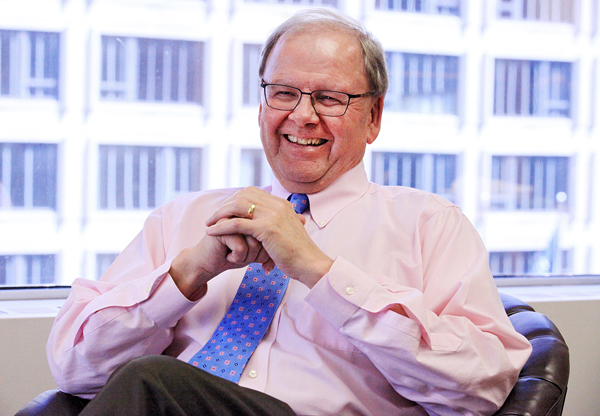Gone farming: Vroom ends 30-year run at CropLife America
Gone farming: Vroom ends 30-year run at CropLife America
- August 31, 2018 |
-
 James Cullum
James Cullum

Vroom says changes in industry mean he's had at least five different jobs as CEO since 1988; cites member surveys as critical to success
 Jay Vroom, former CEO of CropLife America.
Jay Vroom, former CEO of CropLife America.
Photo: James Cullum
Jay Vroom thinks of CropLife America as a farm that needs careful attention. Now, after 30 years as the association's CEO in Washington, D.C., he is heading home to manage his corn and soybean farms in Illinois.
Vroom, 66, weathered his share of storms over the past six presidential administrations, but you can't tell by looking at his office. The walls are bare, everything is packed up and Vroom's successor, former National Corn Growers Association CEO Chris Novak, starts work Sept. 1. Vroom will stay on in an advisory capacity until the end of the year, but from a distance.
"I'm going be out of (Novak's) way," Vroom told CEO Update. "You can reach me any time, day or night. I'll come in here, but I just think it's not healthy for the former CEO to be working here all the time. … I'm looking forward to changing gears and handing over the reins here and going to do some other things."
CLA, the nation's largest trade association for crop protection and pest management, has grown during Vroom's tenure, from about 50 members in 1988 to 120 members today. The association has 50 full-time employees and reports annual revenue of $17 million.
Vroom grew up on his family's 500-acre farm in north central Illinois. He can trace his family's farming roots in America back nearly 500 years, and he's the first person in his family to graduate from college, receiving a degree in agriculture science from the University of Illinois.
As a member of the college's agriculture club, he placed news stories and photographs in local newspapers and talked about agriculture on local radio shows.
"One of the really amazing benefits of being in this job (is) I get to peek behind the curtain at these member companies fairly regularly," Vroom said. "I can tell you without any hesitation that what is coming in the next 15 years will make the last 30 years of innovation look minuscule in comparison. Companies have figured out how to genetically improve crops in a way that is not traditional GMO technology.
So, the shorthand for this is gene editing, but it's really any number of ways to accelerate and accomplish what traditional plant breeding would have taken a decade or even 50 years to do."
Vroom was 36 when he joined CLA after a four-year stint as CEO of the National Fertilizer Solutions Association (now Agricultural Retailers Association) and six years as CEO of the Merchants Exchange of St. Louis. The CLA board charged Vroom with taking a deep dive into the strengths and weaknesses of the organization.
"We were very strong with regard to science and regulatory policies and we had a solid legal department, but the other half of the organization—which was communications and legislative affairs—had to be built up," Vroom said. "It was a different world. When I got here we had no internal computer. We had one fax machine."
Vroom soon confirmed the board's fears that CLA was not challenging federal regulators or effectively influencing public policy. Four months later he was handed a crisis. The U.S. Environmental Protection Agency was considering taking away the judicial appeals process regarding pesticides found to cause cancer and other diseases. The issue gained national attention after a "60 Minutes" special. Vroom was now being quoted in The New York Times, and appearing on radio and television shows.
It ended up being a six-year fight that resulted in the 1996 passage of sweeping amendments to the Federal Food, Drug and Cosmetic Act. He would spend the next 22 years working with EPA to implement the Food Quality Protection Act, staying on top of the commercialization of biotechnology for crops and working to find solutions to conflicts in U.S. pesticide laws and the Endangered Species Act.
"It looks like I've had the same job for three decades, but I've had at least five different jobs when you look at the changes of our industry," Vroom said. "It's just a very rich public policy environment to be at the forefront."
Vroom, who considers himself an engaged leader and not a micromanager, said CLA's future ability to influence national and international commerce will grow, largely because of an annual satisfaction survey given to members. CLA started the survey in 2002 after the resignation of two major members who had a hard time assessing what the organization was doing and how it set priorities.
"That opportunity for members to give us unvarnished, anonymous feedback really empowers the organization to the next level," he said. "And within four years we got these two major members that had resigned back. They've remained extraordinarily engaged and active ever since. And everybody else benefits from this tool as well."
Vroom is retiring from one life of hard work to another. After all, a farm needs constant attention.
"Anyone that believes in the status quo is a fantasy. Everything is constantly changing, and that's true every day on the farm. And it's true in life in general," he said. "I'm proud and honored to have served here for a great industry and have been a significant part of American agriculture. I hope that I've helped farmers remain optimistic, especially when things are tough. They should know that there are better days ahead."
